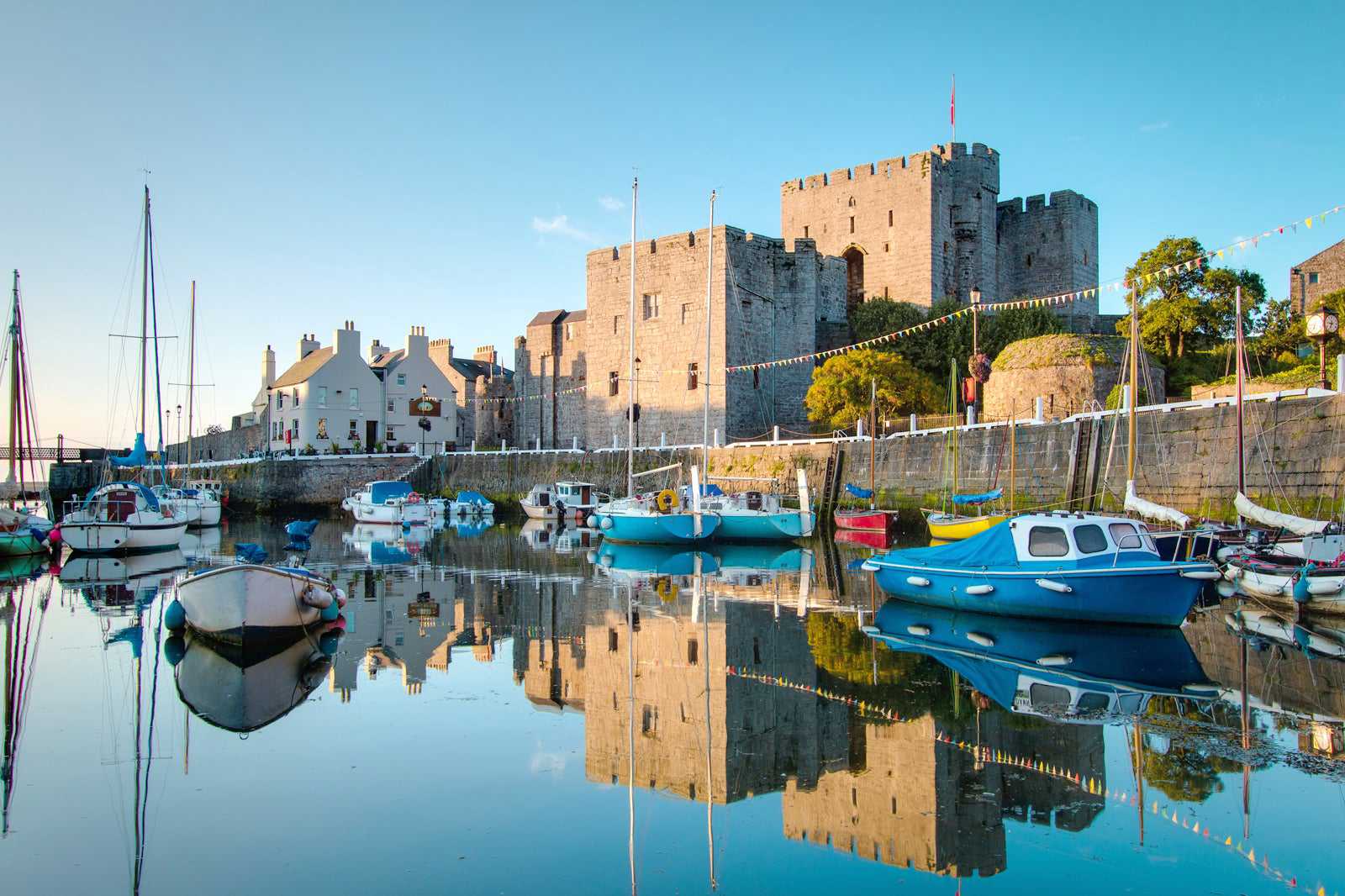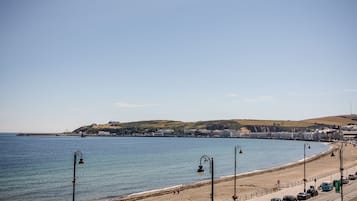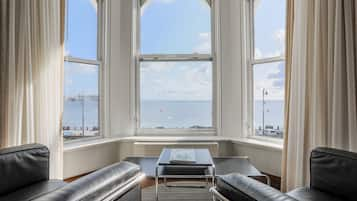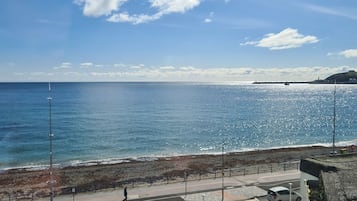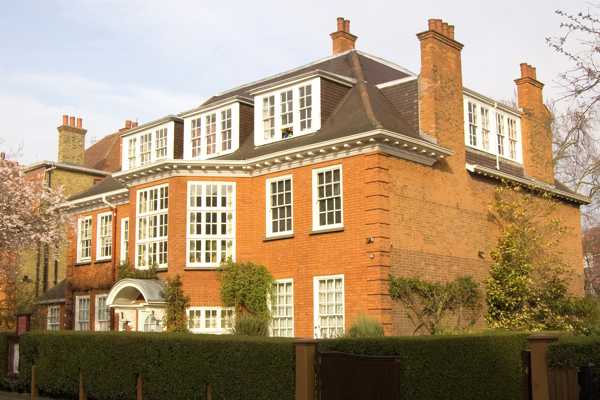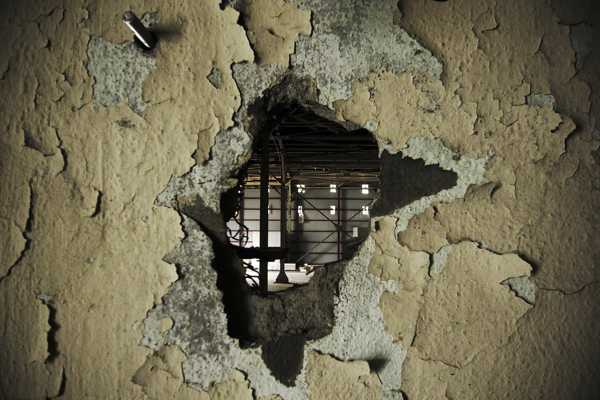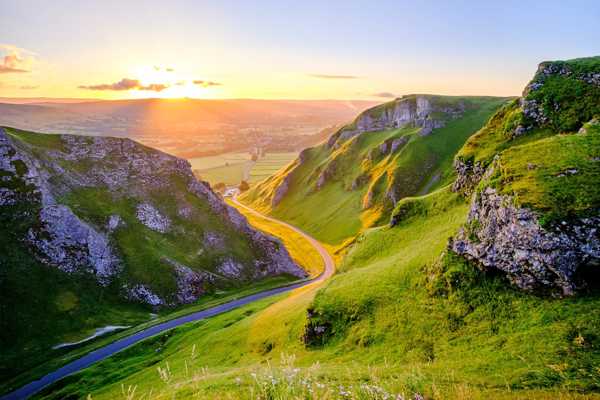The Isle of Man is a place of many unique things to see and do. The vast area is a fascinating collision of old traditions, historic sites and world-famous modern events. It almost seems to like there’s too much crammed onto such a tiny island in the middle of the Irish Sea – certainly too much to see in just one trip.
Somehow, we’ve managed to compress the remarkable list of famous things to see and do on the Isle of Man into a manageable list. It’s quite an eclectic one, ranging from quirky superstitions to tasty treats and amazing views to old-fashioned modes of transport.
What are the best things to do on the Isle of Man?
- 1
Laxey Wheel
A stunning piece of Victorian engineering

- Geschichte
- Foto
The Great Laxey Wheel, also known as Lady Isabella, is the largest working waterwheel in the world at an impressive 72.5 ft in diameter. The striking red wheel revolves 3 times per minute in its white housing. You can climb to the top of that housing, both to get a very real understanding of the wheel’s sheer size and to enjoy the fantastic views of Laxey Valley.
The wheel was built in 1854 to pump 250 gallons of water per minute out of Glen Mooar and the Great Laxey Mines, which it did until the mines closed in 1929. There’s a smaller, lesser-known wheel less than half a mile south – the Snaefell Wheel (or Lady Evelyn) – that’s also worth a visit.
Lage: Wheel Hill, Laxey IM4 7NL, Isle of Man
Öffnungszeiten: April–October: Saturday–Wednesday from 10 am to 4 pm (closed on Thursdays and Fridays)
Telefon: +44 (0)1624 861136
Karte - 2
Snaefell
See the 7 Kingdoms of Man

- Abenteuer
- Geschichte
- Foto
Snaefell is the highest mountain on the Isle of Man, at 2,037 ft above sea level. It’s tall enough that, on a clear day, you can see the so-called “7 Kingdoms of Man” – England, Ireland, Scotland, Wales, the Isle of Man, Heaven, and the Kingdom of Manannán (also known as the sea). Some versions of the popular saying omit the last one, making it only 6 kingdoms.
Getting to the summit is a lot easier than you might think. There’s a clear footpath from the A18 Snaefell Mountain Road that takes about 45 minutes to cover. However, it’s much easier, quicker and quite fun to take the Snaefell Mountain Railway – a Victorian-era electric train that departs from Laxey and reaches the summit in about 30 minutes. After the easy ride, you can enjoy a coffee with a stunning view at the Snaefell Summit Restaurant.
KarteFoto von Luke McKernan (CC BY-SA 2.0) bearbeitet
- 3
Castletown
Discover the island’s former capital

- Geschichte
- Foto
Castletown is a small historical town in the south of the Isle of Man that’s most famous for its castle – the clue’s in the name. Dominating the town centre, Castle Rushen was built for a Viking king in the 16th century. It's still in remarkably good condition, housing a museum that's worth checking out.
Castletown was the capital of the island until 1869. It has an impressive selection of shops and restaurants on its narrow streets. Clustered around a charming little harbour are several interesting museums and historical sites, including the Old House of Keys and the Nautical Museum. While you’re exploring the town, look out for the little fairy doors – there are more than 70 to spot.
Karte - 4
Peel Castle
Explore the ruins of a Viking castle

- Geschichte
- Foto
Peel Castle is an 11th-century Viking fortification on St Patrick’s Isle, just off the west coast of the Isle of Man. Connected to the mainland and the town of Peel by a causeway, the island guards the entrance to the harbour and the western end of Peel Beach.
While Peel Castle has not endured the years as well as Castle Rushen in Castletown, it’s a much larger place and no less awe-inspiring. Be sure to visit St Patrick’s Church and the Round Tower – the oldest parts of Peel Castle – as well as the spooky crypt of the 13th-century Cathedral of St German.
Lage: West Quay, Peel IM5 1TB, Isle of Man
Öffnungszeiten: April–October: Thursday–Sunday from 11 am to 3 pm (closed Mondays–Wednesday)
Telefon: +44 (0)1624 648090
Karte - 5
Drive the TT Races route
Follow in the tyre marks of legends (at a responsible speed)

- Foto
Since 1907, the Isle of Man TT Races has been the highlight of the island’s many festivals and motor-racing events. The whole island becomes motorbike mad for the first week of June, with virtually every hotel and inbound ferry and flight fully booked in advance.
The street circuit starts in Douglas, following the A2 south to Quarterbridge, then heads northwest on Peel Road, turning north onto the A3 at St John’s, which it follows all the way up to Ramsey before turning onto the A18, heading south over the slopes of Snaefell and back to Douglas. Just follow the black-and-white painted kerbs. The 37.4-mile course can be covered in about 17 minutes, but that requires an average speed of 135 mph. Be sure to stop at the statue of Joey Dunlop on Snaefell to pay homage to the Irish racing legend, who was a popular character with locals.
Lage: TT Grandstand, Race Office, A2, Douglas IM2 6DA, Isle of Man
Karte - 6
Douglas Bay Horse Tramway
Ride the world’s last 19th-century horse-drawn passenger tramway

- Familien
- Geschichte
- Foto
The Douglas Bay Horse Tramway is exactly what it sounds like – a horse-drawn tram that runs along the length of the seafront in Douglas. Operating since 1876, it starts from Victoria Pier (near the Isle of Man Sea Terminal) to Derby Castle station, the southernmost terminus of the Manx Electric Railway that follows the coast up to Laxey and Ramsey. The total distance is around 1.6 miles.
The well-cared-for horses – all Shires and Clydesdales – pull a fleet of tramcars that are all over 100 years old and seat between 30 and 42 people. It’s both fun and convenient to get from one end of town to the other.
Foto von Phil Richards (CC BY-SA 2.0) bearbeitet
- 7
Isle of Man Steam Railway
The longest narrow gauge steam railway line in Britain

- Familien
- Geschichte
- Foto
First opened in 1873, the Isle of Man Steam Railway still runs a regular service between Douglas and Port Erin. There are 9 stops along the way, with the major ones including the airport, Castletown and Port St Mary. It takes about 1 hour to complete a one-way journey along the 15.5-mile line.
While riding a steam train is a fun and novel experience, it’s the scenery you pass along the way that makes it a must-do. Noteworthy sights include Crogga Woods, Castle Rushen, and Bradda Head. Once you disembark at Port Erin, check out the Isle of Man Railway Museum.
Lage: 7 Peel Rd, Douglas IM1 4LN, Isle of Man
Telefon: +44 (0)1624 662525
Karte - 8
Point of Ayre Lighthouse
Watch the sunset from the northernmost point of the island

- Paare
- Geschichte
- Foto
The 19th-century Point of Ayre Lighthouse is a striking and still-active structure on the northern point of the Isle of Man. Like many of the island’s historic attractions, it retains much of its original fixtures, including its 1st-order Fresnal lens, installed in 1890, which allows light to be seen clearly in southwest Scotland.
Standing at 98 ft tall, the Point of Ayre Lighthouse is virtually the only noteworthy feature in the breezy northern part of the Isle of Man. It’s a great place to watch the sunset, though, with a car park available near the lighthouse.
Lage: Cranstal Rd, Isle of Man
Karte - 9
Fairy Bridge
Don’t forget to say hello as you cross!

- Foto
- Außergewöhnliche Erfahrungen
Fairy Bridge crosses a tiny stream on the main road between the Isle of Man Airport and Douglas. If it wasn’t for the sign and the white stones marking its presence, you’d barely notice you were crossing it. However, crossing without saying hello to the fairies that reside in little wooded dells is a risky business – it’s considered very unlucky to do so.
The superstition supposedly started around the 1950s and is taken surprisingly seriously. Competitors in the TT Races and Manx Grand Prix often greet the fairies before starting their first practice sessions and even the public buses make an automatic announcement inviting passengers to say, “Hi fairies!” There’s a second Fairy Bridge (often called the “real” one) about 3.3 miles northeast, which is very beautiful and worth a visit. It’s not a road bridge and is, therefore, a lot less popular.
Karte - 10
Cregneash
Experience the life of a 19th-century Manx farmer

- Familien
- Geschichte
- Foto
Cregneash is one of the last bastions of Manx traditions, including ancient customs, farming practises and the distinctive local language. The heritage village has original whitewashed cottages in which you can experience the life of a 19th-century crofter with demonstrations of domestic skills and crafts and stories of the rugged lifestyles.
Out in the fields, you can see unique indigenous animal breeds, including the 4-horned Loaghtan sheep. Indoors, you can stroke one of the naturally tailless Manx cats keeping warm by a traditional kitchen fire range. Visit at the end of October to take part in traditional Hop-tu-Naa celebrations, the local version of Halloween.
Lage: Cregneash Road, Cregneash IM9 5PX, Isle of Man
Öffnungszeiten: Saturday–Wednesday from 10 am to 4 pm (closed on Thursdays and Fridays)
Telefon: +44 (0)1624 648000
Karte - 11
Manx kippers
Enjoy the distinctive flavour of age-old traditions

- Essen
- Geschichte
Manx kippers are a highlight of the Isle of Man’s cuisine. The traditional curing methods used on the whole herring gives it a distinctive deep bronze colour and a smoky, salty flavour.
While you can find Manx kippers at plenty of local restaurants around the island, Moore's Traditional Curers in Peel are perhaps the best at making them. Operating since 1884, they’ve certainly had plenty of time to perfect their craft. Not only can you buy kippers at wholesale prices, but you can also tour their facility if you visit on a Monday between May and mid-September.
Lage: Moore's Kipper Yard, Mill Rd, Peel IM5 1TA, Isle of Man
Telefon: +44 (0)1624 843622
KarteFoto von WordRidden (CC BY 2.0) bearbeitet
